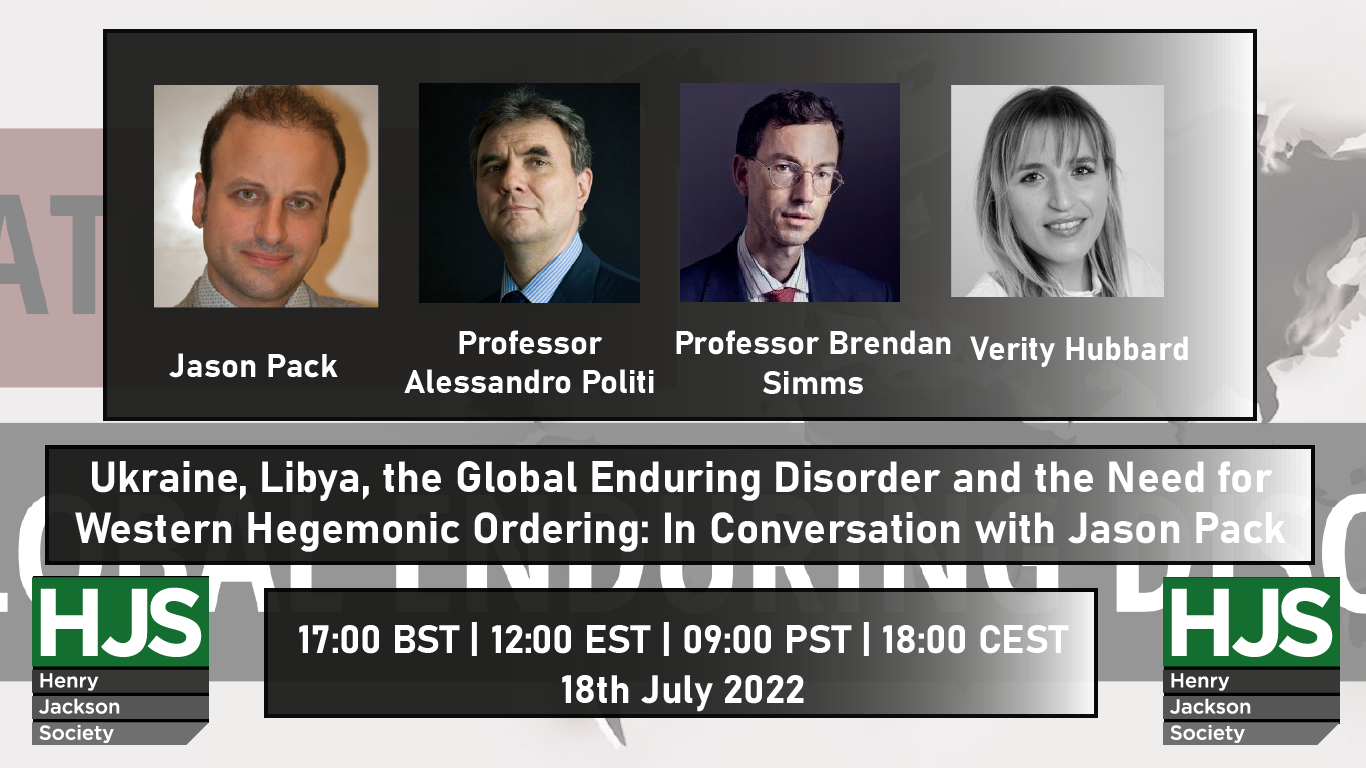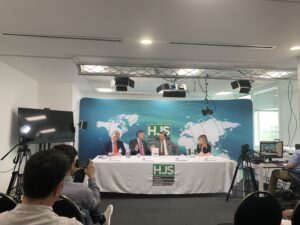Ukraine, Libya, the Global Enduring Disorder and the Need for Western Hegemonic Ordering

- This event has passed.
Ukraine, Libya, the Global Enduring Disorder and the Need for Western Hegemonic Ordering
18th July 2022 @ 5:00 pm - 6:00 pm

The world seems to have gone directly from a hegemonic US-led international system to an interregnum in global order. The traditional phase of multipolarity—or a restoration of the balance of power, or even a struggle among rival systems of order, has been skipped.
Jason Pack’s newest book, Libya and the Global Enduring Disorder, presents the Libya and Ukraine conflicts as an ideal microcosms for examining the collective action failures typical of our new geopolitics. Its publication serves as an examination of the current state of the world and American and Western policy towards key geostrategic hotspots framed in light of Mr Pack’s Enduring Disorder concept.
This event will also launch the NATO and Enduring Disorder Project which Mr Pack will co-host at the NATO Defense College Foundation in Rome and the Henry Jackson Society. Broadening out from the discoveries of his core research on Libya, the panellists will discuss how the West’s response to the Ukraine crisis highlights where today’s geopolitics seem to be headed — bringing into sharp focus the need for a Western-led, rules-based global order.

Jason Pack is the Founder of Libya-Analysis LLC and the non-profit Eye on ISIS, which creates the Libya Security Monitor. His most recent book, Libya and the Global Enduring Disorder (Hurst/Oxford University Press) explores what Libya’s dysfunctional economic structures, its ongoing civil war, and the lack of a coordinated international response to chaos in the country reveal about broader patterns in 21st century geopolitics.
In his role as an Associate Fellow with HJS and Senior Analyst for Emerging Challenges with the NATO Defense College Foundation, he will lead a special programme entitled “NATO and the Global Enduring Disorder,” which will produce a range of content (including a podcast and series of publications) with the ‘modest goal’ of sketching out a ‘unified field theory’ of our current era of geopolitics, while proposing actionable solutions to our most pressing collective action challenges like climate change, tax havens, Ukraine, and cybersecurity.His analysis and opinion articles have appeared in The New York Times, The Wall Street Journal, The Spectator, Newsweek, The Financial Times, The Guardian, Foreign Policy, and Foreign Affairs. He holds an M.St. in Global and Imperial History at St. Antony’s College, Oxford in 2011. He is a recipient of the UK Global Talent Visa and has been endorsed by the British Academy as a ‘global leader in his field’.

Alessandro Politi is a global political and strategic analyst with 30 years of experience. Director since 10 years of the NATO Defense College Foundation, the only NATO-affiliated NGO strategic affairs centre. He teaches geopolitics and intelligence at the SIOI. He was senior researcher for the Italian MoD on Latin America, leading also the Global Outlook project. He has worked with four Defence Ministers, while consulting for other three major decision makers and several governmental bodies. He has published in various roles 50 books on strategic and security matters. Latest books: Shaping Security Horizons – Strategic Trends (2012-2019), Goodbye Merkel (2021).

Professor Brendan Simms is Director of the Centre for Geopolitics, Cambridge and President of the Henry Jackson Society. He teaches at both undergraduate and graduate level in the Department of Politics and International Studies (POLIS) and the Faculty of History.
Professor Simms is a frequent contributor to print and broadsheet media. He has advised governments and parliaments, and spoken at Westminster, in the European parliament and at think-tanks in the United Kingdom, the United States and in many Eurozone countries. The Centre for Geopolitics is designed to draw together all these interests.

Verity Hubbard is a Senior Analyst at Libya-Analysis LLC. She’s worked as a MENA analyst in the security sector, in the UK Parliament, and for multiple think tanks in London and Brussels. Verity studied Theology at the University of Oxford and she holds a Masters in Russian and Eastern European Politics from University College London. Verity has conducted research on explosive weapons in Côte d’Ivoire and Kenya and written for publications including The Spectator.
***
EVENT SUMMARY

The Henry Jackson Society was pleased to hold a discussion on the ‘enduring disorder concept’ and the role of the West in specific conflicts, such as Libya or Ukraine. Verity Hubbard began the conversation by introducing the speakers and Jason Pack’s book ‘Libya and the Global Enduring Disorder’. Jason Pack discussed the reasons of leaders such as Putin, Orban or Bolsonaro for fighting or promoting an ‘enduring disorder’. He highlighted that the conflicts in Libya and Ukraine are also the results of a lack of collective action in the world system. Prof Alessandro Politi approached the concept from a historical perspective, focusing on the Cold War. Dr Alan Mendoza emphasized the possible role of the United Kingdom as an ordering force. Finally, the speakers answered questions on the economic aspect of ‘enduring disorder’, the role of irrational actors in seeking disorder, historical examples of this phenomenon and the impacts of the failure of the Libyan regime.
RELATED EVENTS
British General Election Campaigns 1830-2019: Can The Past Inform The Future?”
The British general election is the linchpin of our liberal democracy, and its results are often fundamental to how we live. With the next UK general election looming, there is therefore … Continued



